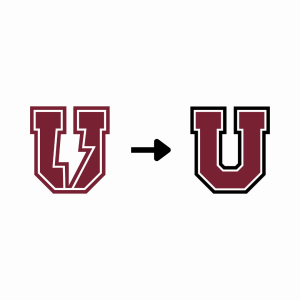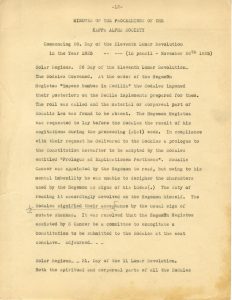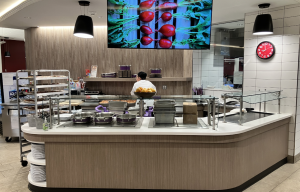“Uninformed and Unprotected”: Union Residential Advisors discuss the Campus Quarantine
Sunset illuminating the Nott Memorial .
January 28, 2021
On January 17, an email by the COVID-19 Updates account put in place new restrictions on students’ movement on and off campus to curb the spread of COVID-19 within the community. The responsibility of “upholding these guidelines” and “serve as role models”, according to Amanda Iverson, Director of Residential Life, then befell the student residential advisors (RAs) across the several dorms on campus. Concordiensis has since then reached out to them to learn about their experiences. A majority of those interviewed expressed disappointment in the process of release of information, lack in clarity of rules and low pay for their job.
Confusion and Chaos
According to Iverson, the RAs received notification of the campus quarantine guidelines at the same time as all other community members. Emma Withey ’23 who is an RA in Webster, a first-year dorm, recalls that she was visiting her girlfriend off-campus when she saw the email. “I did not know how to respond to my residents’ questions. We found out about the guidelines just as everyone else did, so we did not know how to implement them or what to say to our residents who had so many questions,” Withey said.
“There was a huge potential of collaboration [with Residential Life] and much better implementation of rules that was lost,” says Ben Weiss ’23, RA at Davidson, another first-year dorm. “We [RAs] don’t need to decide what the guidelines are but we should at least be given a notice before they are released to the whole campus … It’s like we’re being overlooked as the sole enforcers of those rules [in residential spaces],” he added.
Weiss shared that one of his residents had a job off campus that they relied on for their steady income and they didn’t know what to do since they were supposed to be working after 5 but the campus quarantine was set to go into effect at 5 p.m. “You have this massive email going off, some of the RAs are off campus, some haven’t checked their emails…whatever their case is, ready or not, prepared or not, you have five to ten residents texting asking you to clarify this and specify that and then you reach out to your Residential Director but they only found out thirty minutes before you so nobody knows what to do,” Weiss said.
“I am a student sending another student home” – Ben Weiss ’23
Liana Ralli ’22 who is an RA in West mentioned that it wasn’t until multiple RAs had reached out to their Residential Directors seeking guidance that a meeting to clarify the implementation of the new rules was finally held. Even after the meeting with her Residential Director, Athena Bo ’22, RA at Davidson, reported feeling just as confused as before. “I don’t know what happens once I file a report against any resident under these new guidelines. I have written people up multiple times and they still haven’t been sent home while I have heard of others who have been switched to a remote status.” Out of the “489 possible COVID-19 policy violations” in Fall 2020, there were “231 findings of responsibility for COVID-19 violations”, according to Iverson. The new rules state that the students will have their mode of instruction immediately changed to remote if they are found violating the campus quarantine policy. As of January 26, there have been 15 violations of the COVID-19 policy since the campus was placed on quarantine on January 17, Iverson told Concordiensis.
Weiss expressed that he has been so afraid of filing a report because he doesn’t want to be the reason someone gets sent home. He further mentioned that if there were clearer distinctions on gravity of the violations and consequences, he would feel more comfortable making a report. “COVID-19 brought this huge gray area for the role of the RA, on what we enforce and what we choose to report … because there is so much lack of information every RA is left to interpret this gray area individually on random judgement calls leaving our defences against the pandemic up to chance,” Weiss said.
According to Weiss, it wasn’t until this term that an email was sent out to the RAs formally sharing how the limit on the number of people allowed to be in the same residential unit varies across the several residential dorms on campus.
“They [residents] are making a choice not to be safe while I’m being forced to not be safe” – Emma Withey ’23
“We have more [risk of] exposure while doing our jobs than most people. At any point of any term, it is a healthy assumption that someone in Davi[dson] has COVID-19. This means someone with COVID-19 has touched a handle. While doing my rounds or being on duty, I have to touch all these doorknobs and I am not even provided with any extra masks or gloves.” Bo said.
The RAs have not been supplied with N95 masks as they are not being asked to do tasks where specialized PPE is necessary, according to Iverson. “Due to supply issues, those types of PPE are reserved for staff who are working directly in positions in which there is a strong possibility of exposure to a confirmed positive individual or affected space,” Iverson told Concordiensis via email.
“The Residential Life team has worked to establish protocols to protect the health and safety of the staff. Those protocols at times have included a shift away from entering private residential spaces,” Iverson told Concordiensis. However, both Carolina Missura ’22, who is an RA at College Park Hall and Withey shared that even though they have been told that they can call campus safety when they don’t feel comfortable entering a residential space, often they need to still guide the reporting, which is why most RAs do not end up using this alternative. Withey, Ralli and Bo also agreed that it is not possible to de-escalate a situation or report people without being able to enter another residential space and risking your safety.
Underpaid and Exhausted
According to Iverson, in a regular term, “Union RAs receive a 50% room credit and a stipend of $1000″. They also receive a single room equipped with a microfridge and staff uniform gear. Throughout the interviews conducted with RAs by Concordiensis however, most agreed that this is not enough. “We are not being paid enough for our jobs especially now, during a pandemic,” Withey and Bo said.
Whenever the point of increasing their pay is raised it is met with the argument that the duties have diminished during the pandemic, Missura told Concordiensis. However Missura argues that even though they might not be likely to face a party during their duty time, they would still be responsible for the wellbeing of their residents who are struggling during this challenging time as well. Ralli shared how she feels that her mental health and wellbeing is not considered while she is tasked with looking out for her residents. She elaborated on how taxing it can be to chasing down one residents for not wearing their masks properly, checking on another one who isn’t feeling well all while not being recognized or appreciated for the efforts you’re making.
When asked whether the RAs are being compensated for the extra responsibilities this term, Iverson told Concordiensis that the RAs do not have any extra responsibilities. The nature of their responsibilities has shifted due to COVID-19, but they are not being asked to put in any time over and above the amount of time they normally contribute to their jobs.
Missura also relayed that in the Summer 2020 while she had to stay back on campus after her country shut the border, she had applied for the Persistence Fund and received funding to pay for her housing and meal plan. Later, she had been approached with the offer of a Summer RA position. Inquiring about her pay for the summer, she was informed that since she had been given free housing and meal plan, she will not be paid for the summer.
According to Iverson, last summer, due to COVID-19 concerns, a meal plan worth $1045 was offered and ‘all students were expected to be on the meal plan’. Typically, summer RAs are compensated with a full room waiver for the summer and a stipend of $400. However, last year the cost of the meal plan was also added to the housing waiver for the Summer RAs. “Given that this was significantly more than the stipend they are typically paid, the full room and board waiver was their compensation last summer,” Iverson said.
Missura argues that since she had already received Persistence funding for full room and board and never used the waiver, she should have been paid her $400 stipend. She also shared that the CPH kiosk that had been set up for the students to use their meal plan closed down three weeks before the beginning of Fall Term leaving her without any stipend or food to support herself for that period of time.
Out of the ten RAs interviewed by Concordiensis covering five out of the six residential dorms at Union, nine felt that they are paid much less than what should be for a job that requires such effort while all agreed that they do not have proper briefings or equipment to help them in the face of the pandemic. Out of the ten people approached, only three refused to be on the record for the purpose of this article fearing retaliation from Residential Life.







